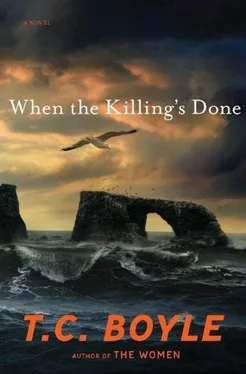She’s surprised at the number of cars in the parking lot. Every spot seems to be taken, at least the ones close in, and people are circling in predatory mode, the rain heavier now, sheeting across the blacktop and giving back the sheen of the headlights in a polished waxen glow. “Looks like you attracted quite a crowd,” he says, leaning over the wheel on both forearms to peer out into the night while waiting for the car ahead of them, a black BMW, its left rear blinker pulsing frantically, to make up its mind: left, right or straight ahead? The delay is maddening. The kind of thing that drives her over the line, indecision, inattentiveness, the laziness of people who won’t drive to the end of the lot for fear they might have to walk an extra twenty feet, who sit back with a bag of potato chips in one hand and a Cherry Coke in the other and wonder why all of America is fat and getting fatter. She actually leans forward to reach across the console for the horn— What is with these people? — before snatching her hand back. She can’t afford to be rude. Not here. Not tonight. How devastating would it be for the speaker, the guest of honor, to get caught up in some petty embroilment in the parking lot?
She says: “There must be something else going on.”
“Uh-uh. Not that I saw in the paper anyway.” The car ahead of them creeps forward, the frantic winking eye of the blinker dying out on the left only to reanimate itself on the right. Then the brake lights flare and the car stops. Again. Beyond it, she can see the illuminated forms of couples hurrying across the pavement, bowed beneath the weight of their umbrellas, and that’s when it comes to her that she’s forgotten her own.
“Tim? Did you bring an umbrella?”
He gives her one of his astonished looks, eyebrows rocketing, eyes blown open, lips scrambling for an expression, at once a parody of and homage to his favorite late-night TV host. He can be very funny, Tim, nothing sacred to him, no occasion too solemn or pressing for a gag. But this isn’t the time. Or place.
“You didn’t then?”
He shakes his head, still mugging, as if this were all a big joke, as if he could even begin to soothe her at this point. “No. Sorry. Uh-uh. You want me to swing around and drop you at the door? Or I’ll carry you. Want me to carry you?”
“No,” she snaps, thinking of ruined hair and smeared makeup, thinking of standing up there at the microphone looking as if she’s just fallen off a boat. “No, I do not want you to carry me. Didn’t you know it was going to rain? Didn’t you think?”
Before she’d taken him to Scottsdale to meet her mother the first time, after they’d been seeing each other for a month, she’d given him a full accounting of her mother’s character, habits and predilections, and while it was for the most part a loving portrait, it was unsparing too. Her mother was a shopper. An inveterate shopper. A shopaholic. There was nothing she didn’t collect, from ceramic stringheads to Zuni turquoise, Fiesta ware, porcelain dolls, antique dustpans and Victorian furniture so dense and dark it squeezed all the light out of every room in the house. In the face of a dying planet and the exhaustion of resources, this would be shame enough for any daughter to bear, but for an ecologist who’d devoted her adult life to educating the public, it was crippling and inexplicable. And hurtful, deeply hurtful. She felt bad about it on so many levels, about mentioning it even, as if she were betraying her mother and her mother’s love. And what was the first thing Tim said to her mother? “I can appreciate the hoarding urge,” he told her, sinking into the couch in the living room with the gimlet she had just handed him, “whether it’s environmentally correct or not. My mother — you’ll meet her, she lives in upstate New York, but she comes out to visit maybe twice a year — my mother used to be like that. And then I told her, ‘Look, going antiquing for women is like fishing for guys, I understand that. But in this age of conserving resources, most of us practice catch and release.’ You know, you get the thrill of stalking the trout, flicking out the fly, pulling this mysterious beautiful thing out of the water, one in a million, precious as gold, and then you let it go. Same thing with my mother nowadays, because she’s totally reformed — she goes to the store, finds a precious whatever it is, bargains like a fanatic, like she’ll die if she pays a nickel more, then counts out the money, watches the guy wrap it up, and hands it right back to him. You know what I’m saying? Catch and release.”
He doesn’t respond. But he’s begun inching forward, flicking his brights on and off by way of suggesting to the people in the BMW that their behavior stands in need of correcting. “Why don’t they just park in the middle of the fucking street? Come on,” he mutters, coaching them, “come on .” Whoever they are — shadowy forms emerging suddenly in sharp relief, the back of a man’s head and a woman beside him, in profile, her hair massed like an unraveling turban — they’ve begun to get the idea. There’s a quick sharp movement of the man’s shoulders, the wheel swinging right, and the car rolls grudgingly out of the way.
That’s when the feeling comes over her — what is it, dread, mortification, hate? — and she doesn’t want to know, doesn’t want to look, staring rigidly ahead, as if she’s been frozen in place, as Tim pulls even with them, right there, right in the operatic glare of the headlights of the next car in line. She can feel his eyes sweeping sourly over them, the engine of the Prius gurgling softly, the windshield wipers beating time and the faintest whisper of a voice leaking from the radio as he eases past, but she doesn’t turn her head. She’s shut them out, negated them, hide-and-seek, but not before the sticker on the side window leaps out at her, vermilion letters on an electric yellow background superimposed over the figure of a cartoon rodent’s anthropomorphized face. FPA , it reads, and beneath it, in characters that seem to bleed away from the banner: For the Protection of Animals .
But then she feels the car accelerate and they’re parting the curtain of rain, or at least the visible portion of it, wheeling down the long double line of parked cars and back up again on the far side. Before she can protest he’s pulling up in front of the entrance, on the wide strip of macadam reserved for Pedestrians Only , skidding to a stop within inches of the snaking line of slickered, umbrella-wielding people waiting to purchase tickets in the rain, already leaning forward to reach across her for the door. “Go ahead,” he says, the seat belt tugging at his shoulder and the smell of him — of his aftershave and shampoo and the hot fungal odor of the hair under his arms and between his legs, her leman’s smell, her mate’s — rising to her, primal and comforting and confusing all at once. For a moment she doesn’t know what to do. “I’ll park back there someplace at the end of the lot,” he tells her, making a vague gesture at the expanding arena of shadow behind them, “and catch up with you later.” The door swings open. She unfastens her seat belt, tucks her folder and laptop under one arm, and emerges to the breeze and the blown rain and the taste of it on her lips, sweet and rank all at once. He’s watching her. Grinning. “Break a leg,” he says.
Before she can respond — and what would she say anyway, I’ll try ? — here’s Frieda Kleinschmidt, the museum’s director, stalking up to her with a bright pink parasol, the lights along the walkway fuzzed with mist, people looming out of the shadows to hunch under the parapet, furl umbrellas and stamp and blow and brush the rain from sleeves, shoulders, hats. Tall, narrow-shouldered, her face clenched round the shine of her steel-framed glasses and the alarm in her magnified eyes, Frieda stands there rigid, staring at the Prius skewed across the pavement where no car has ever dared go before it. She shoots an anxious glance at Tim— No , he’s not a terrorist, Alma wants to tell her, only my boyfriend —and then says, “You picked quite a night for it. Who would have thought?” She pumps the umbrella in evidence, then lowers it again to Alma’s height. “I mean, it was clear an hour ago. Wasn’t it? I thought it was anyway. Last I looked.”
Читать дальше












